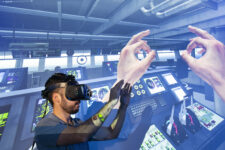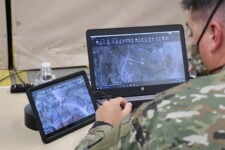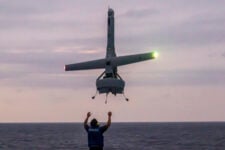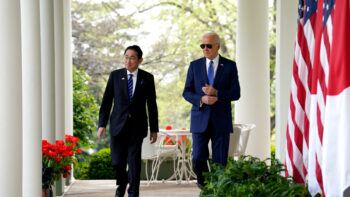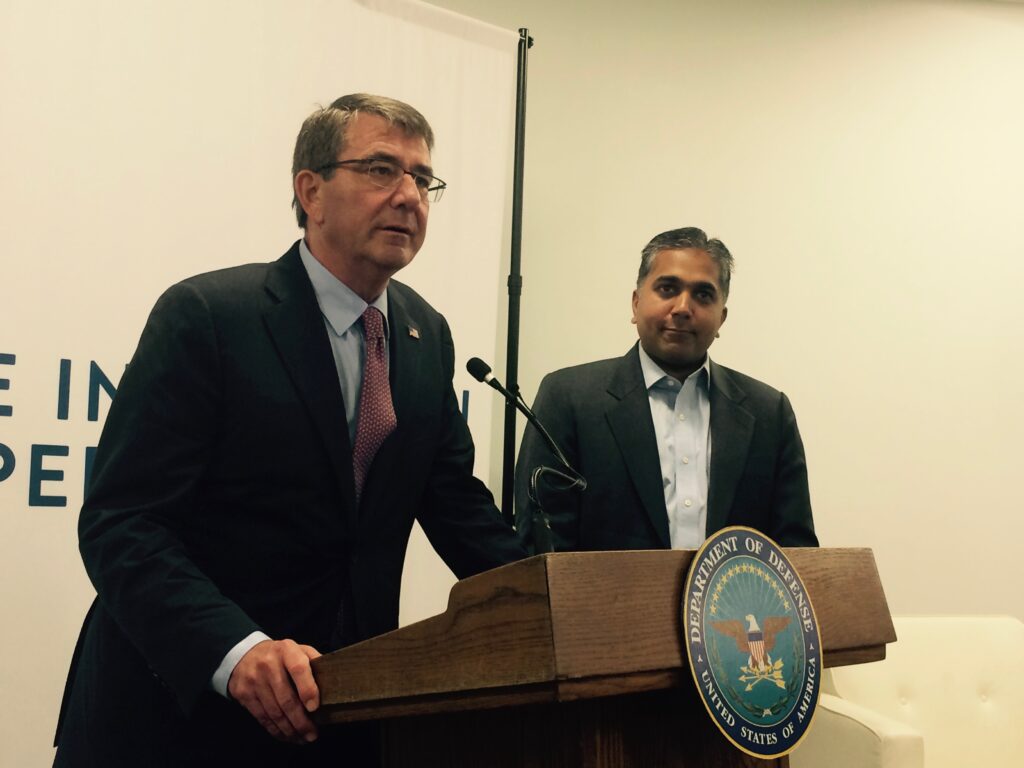
Defense Secretary Ashton Carter (left) and DIU(X) director Raj Shah (right) speak to reporters at the opening of DIU(X) Boston.
UPDATED: Carter Touts Import Of Biotech
CAMBRIDGE, MASS.: Special operations troops will test a high-tech headset that “uses noninvasive electrical stimulation” to help the brain learn better marksmanship and hand-to-hand combat skills, Defense Secretary Ashton Carter said here today. This cutting edge example of “enhanced human operations” — a highly controversial field — is just the first commercial project funded by Carter’s recently reorganized Defense Innovation Unit (Experimental), DIU(X).
Carter overhauled the original Silicon Valley DIU(X) 75 days ago, politely replacing the entire leadership and bringing the organization under his personal control. Today he’s in Cambridge — just blocks from MIT and 15 minutes from Harvard Yard — to formally open a long-awaited DIU(X) branch on the East Coast. He also announced new luminaries joining the Defense Innovation Advisory Board, including Amazon CEO (and Washington Post owner) Jeff Bezos and pop science superstar Neil deGrasse Tyson.
Both the Silicon Valley and Boston branches of DIU(X) will fall under F-16 pilot turned tech entrepreneur Rajiv Shah, the man Carter tapped to lead in June. DIU(X)’s role, Shah told reporters after Carter’s public remarks, is to work with the country’s most innovative companies “at the speed they are used to and are comfortable with.”
“DIU(X) is supposed to be a pathfinder here,” Carter added at the press conference. Ultimately, he said, it’s supposed to work itself out of business as its more agile, innovative approach spreads throughout the Pentagon.
DIU(X) and the established bureaucracy can work together — indeed they must. Shah worked with traditional career civil servant, Paul Milenkowic — executive director of Army Contracting Command at Picatinny Arsenal in New Jersey — to come up with a high-speed mechanism to find and fund innovative ideas without the traditional Pentagon paperwork, the “Commercial Solutions Opening.” The CSO builds on new prototyping authorities Congress passed just last fall, Carter said, making sure to praise legislators for the reform.
The contract for the neural stimulation headset was signed “in only 31 days,” Carter said. Aptly named Halo Neuroscience saw a Commercial Solutions Opening posted online, sent in its pitch, and got selected for further examination and finally funding. Instead of rigid requirements, each CSO has a broadly defined need that companies can tackle any way they want. Recently posted “problem sets” include “network endpoint inspection, high-speed drones, and multifactor authentication,” Carter said.
All told, some “15 separate prototyping projects” are underway, Carter said, including a mini-drone designed to fly through houses and scout out rooms ahead of troops, preventing deadly ambushes. What he didn’t say was how that’s a start contrast from the slow and unsteady pace of the original DIU(X).
Shah reorganized DIU(X) into three teams, Carter explained today:
- a “Venture” team that helps fund promising commercial technologies. Despite the name, it doesn’t provide venture capital as such, but rather R&D grants, with 50 percent of the money coming from DIU(X) and 50 percent from a potential customer in the Defense Department (say, the Office of Naval Research for a robot boat, Cyber Command for anti-hacker software).
- an “Engagement” team which brings military personnel and civilian entrepreneurs together.
- a “Foundry” team” that nurtures the technology that needs the most maturation or most adaptation to meet military needs. This team sends military officers to do “warfighter in residence” stints with industry and brings commercial innovators into the Defense Department as “entrepreneurs in residence.”
“One of the first things they’re doing is exploring the military application of virtual and augmented realities,” Carter said, as well as robotics and space technologies.
Boston is a hub for multiple technologies, but it particularly shines in biotech. “Where I think Boston is especially important,” Carter told reporters, is “the union of biology and engineering and data, which is going to be an area of great innovation but also of great consequence for humankind.”
Hence you have the Halo Neurosciences products to boost learning rates, which DIU(X) director Shah said is widely used by “leading athletes, Olympic athletes.”
But what about the ethical implications of reaching into someone’s brain — even “noninvasively” — to alter their mental processes?
“The bio sciences, like all technologies in the past, will be used for good and for ill,” Carter told reporters. “Our job is to make sure that our society is protected and that our military is at the frontier of that field.”
‘The bad day’: DISA’s forthcoming strategy prepares for wartime coms
“It’s great to have internet day to day in peacetime,” said Lt. Gen. Robert Skinner, director of the Defense Information Systems Agency, “but it’s more imperative to have it when bullets are flying.”









